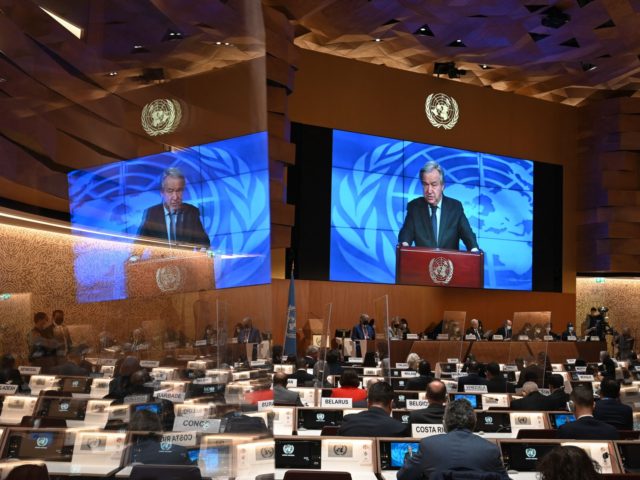The British government is slashing the amount of foreign aid money it routes through international organisations such as the United Nations, outraging leftist politicians and activist charities.
At present, nearly 40 per cent of Britain’s foreign aid budget, still bloated at roughly £11.5 billion — about as much as is spent on the country’s bursting prisons and shuttering law courts combined — despite recent temporary cuts, is doled out “to the UN, the World Bank, European Union, and other global bodies” to spend, and sometimes dubiously, according to the BBC.
That appears to be set to change, however, with the publicly-funded broadcaster reporting that the government intends to cut the share of the foreign aid budget allocated to such organisations to “just” 25 per cent by 2025.
“In an increasingly geopolitical world, we must use development as a key part of our foreign policy,” said Liz Truss, whose Foreign and Commonwealth Office now incorporates the former International Development department responsible for disbursing foreign aid.
“Malign actors treat economics and development as a means of control, using patronage, investment and debt as a form of economic coercion and political power,” she said, in what the BBC said was a reference to the People’s Republic of China — although it was not mentioned by name — using development money to win concessions from and exert influence over poorer countries.
“We won’t mirror their malign tactics, but we will match them in our resolve to provide an alternative,” the British foreign minister suggested.
Bill Gates Demands United Kingdom Reverse Foreign Aid Cuts, Send Corona Vax Abroad https://t.co/j76sc5p8IW
— Breitbart London (@BreitbartLondon) April 27, 2021
The proposal has outraged the left, with the Labour Party representative for the grooming gangs hotspot of Rotherham, Sarah Champion MP, complaining that “[s]upporting the poorest in the world should not be conditional on a trade deal or agreeing to investment partnerships.”
“The UK has rightly been hugely critical of China for such an approach, so I fail to see why we are following down the same road. It is depressing and disappointing that the UK would devise a strategy like this,” she told the BBC, horrified by the idea that British taxpayers might see some benefit from huge sums of their money being diverted overseas during while a cost of living crisis rages at home.
The notionally impartial broadcaster, quoting only critics of the changes, also cited Layla Moran MP of the Liberal Democrat as saying that “the government’s misguided new focus on ‘aid for trade’ is yet another blow for the world’s poorest,” denouncing it as a “callous decision” that means “harming the most vulnerable around the world”.
Executives at two activist aid charities, Bond and Cafod, were also quoted as criticising the policy for, as the BBC put it, “failing to prioritise health, climate change and open societies.”
Stephanie Draper, for the former, repeated the Liberal Democrats’ political “aid for trade” line, alleging that the move for the British to choose how more of their aid money is allocated themselves “seems largely driven by short-term political and economic interests rather than the attempt to tackle the root causes of global crises such as inequality, conflict and climate change, which impact us all.”
Christine Allen, for the latter, also complained that Britain should not be “reneging on existing aid commitments for a narrow self-interest on UK trade and business.”
Corrupt Foreign Officials Directing British Foreign Aid to Organised Crime Syndicates https://t.co/JnoeAcsAd4
— Breitbart London (@BreitbartLondon) November 3, 2018
Follow Jack Montgomery on Twitter: @JackBMontgomery
Follow Breitbart London on Facebook: Breitbart London

COMMENTS
Please let us know if you're having issues with commenting.